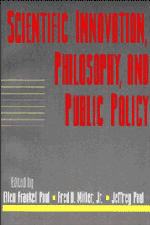Book contents
- Frontmatter
- Contents
- Introduction
- Acknowledgments
- Contributors
- The Human Genome Project: Research Tactics and Economic Strategies
- Choosing Who Will Be Disabled: Genetic Intervention and the Morality of Inclusion
- Germ-Line Genetic Engineering and Moral Diversity: Moral Controversies in a Post-Christian World
- Self-Critical Federal Science? The Ethics Experiment within the U.S. Human Genome Project
- When Politics Drives Science: Lysenko, Gore, and U.S. Biotechnology Policy
- Biotechnology and the Utilitarian Argument for Patents
- Property Rights Theory and the Commons: The Case of Scientific Research
- Property Rights and Technological Innovation
- Medicine, Animal Experimentation, and the Moral Problem of Unfortunate Humans
- A World of Strong Privacy: Promises and Perils of Encryption
- Computer Reliability and Public Policy: Limits of Knowledge of Computer-Based Systems
- Responsibility and Decision Making in the Era of Neural Networks
- Preposterism and Its Consequences
- Index
Introduction
Published online by Cambridge University Press: 04 August 2010
- Frontmatter
- Contents
- Introduction
- Acknowledgments
- Contributors
- The Human Genome Project: Research Tactics and Economic Strategies
- Choosing Who Will Be Disabled: Genetic Intervention and the Morality of Inclusion
- Germ-Line Genetic Engineering and Moral Diversity: Moral Controversies in a Post-Christian World
- Self-Critical Federal Science? The Ethics Experiment within the U.S. Human Genome Project
- When Politics Drives Science: Lysenko, Gore, and U.S. Biotechnology Policy
- Biotechnology and the Utilitarian Argument for Patents
- Property Rights Theory and the Commons: The Case of Scientific Research
- Property Rights and Technological Innovation
- Medicine, Animal Experimentation, and the Moral Problem of Unfortunate Humans
- A World of Strong Privacy: Promises and Perils of Encryption
- Computer Reliability and Public Policy: Limits of Knowledge of Computer-Based Systems
- Responsibility and Decision Making in the Era of Neural Networks
- Preposterism and Its Consequences
- Index
Summary
Recent and ongoing developments in science and technology—such as the prevention and treatment of disease through genetics and the development of increasingly sophisticated computer systems with wide-ranging applications—hold out the promise of vastly improving the quality of human life, but they can also raise serious ethical, legal, and public-policy questions. What direction should scientific inquiry take, and what moral principles should guide it? To what extent and in what ways should governments use public policy to encourage, support, influence, or inhibit scientific and technological research? And when governments do become involved, how can we prevent politics from exercising an inappropriate influence on the course of research?
The thirteen essays in this volume address these questions and related issues from a variety of perspectives. Some explore the implications of genetic engineering, discussing the role of government in funding research in this area and in regulating the uses of the medical technologies which may emerge from it. Some examine the propriety of using genetics to enhance human abilities and ask whether we need to be concerned about the inequalities that may result from such uses. Other essays discuss the need for laws protecting the intellectual property of scientific researchers, attempting to determine whether, on balance, patents promote progress by providing financial incentives or inhibit it by restricting research in areas where there is a danger of liability for patent infringement.
- Type
- Chapter
- Information
- Scientific Innovation, Philosophy, and Public Policy , pp. vii - xvPublisher: Cambridge University PressPrint publication year: 1996

